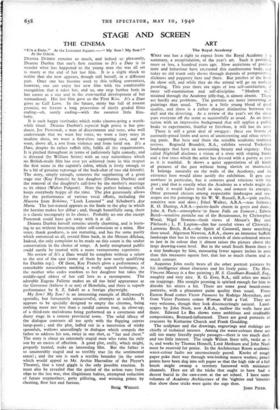STAGE AND SCREEN
THE CINEMA
",It's a Date." At the Leicester Square.—“ My Son My Son!" At the Odeon.
DEANNA DURBIN remains so much, and indeed so pleasantly, Deanna Durbin that one's first reaction to It's a Date is to wonder what has happened to the young man she was all set to marry at the end of her last film. It is a slight shock to realise that she now appears, though still herself, in a different part. Once one has become used to this trifling convention, however, one can enjoy her new film with the comfortable recognition that it takes her, and us, one step further both in her career as a star and in the ever-tactful development of her womanhood. Her last film gave us the First Kiss. It's a Date gives us Calf Love. In the future, misty but full of roseate promise, we foresee a long procession of nicely graded films ending—oh, surely ending—with the sweetest little film- baby.
It is such happy certitudes which make cinema-going a worth-
while ritual. Deanna Durbin's especial high priest is her pro- ducer, Joe Pasternak, a man of discernment and taste, who well understands that we want her voice, we want a fairy story in modern dress, we want a first-class supporting cast, and we want, above all, a rest from violence and from lurid sex. It's a Date, despite. its rather raffish title, fulfils all the requirements. It is pitched throughout in terms of judiciously light comedy, and is directed (by William Seiter) with an easy naturalness which no British-made film has ever yet achieved (note in this respect the first scene in the captain's cabin, which is lively enough to be a bit of genuine reportage of the back-chat of two old friends). The story, simply enough, concerns the supplanting of a great stage star (Kay Francis) by her daughter (Deanna Durbin) and the removal of the daughter's calf-love by the mother's marriage to its object (Walter Pidgeon). Note the perfect balance which keeps everybody happy all the time. The plot generously allows for the performance of various vocal efforts, including the Musetta from Boheme, "Loch Lomond" and Schuberes Ave Maria. The last-named appears as the finale to the play in which the heroine makes her debut ; and, though beautifully sung, there is a classic incongruity in its choice. Probably no one else except Pasternak could have got away with it at all.
Deanna Durbin herself remains utterly charming, and is learn-
ing to act without becoming either self-conscious or a minx. Her voice, thank goodness, is not maturing, and has the same purity which entranced us all, several films back, in the Mozart Alleluia, Indeed, the only complaint to be made on this count is the undue conservatism in the choice of songs. A justly enraptured public could surely be trusted with a more venturesome repertoire.
No review of It's a Date would be complete without a salute
to the rest of the cast (some of them by now surely qualifying for Durbin rep.). Of these, Kay Francis gives a performance of remarkable naturalness masking a really superb technique, as the mother who cedes stardom to her daughter but takes the middle-aged object of her calf love as a recompense. The adorable Eugene Pallette makes an all too brief appearance as the Governor (believe it or not) of Honolulu, and there is superb performance by S. Z. Sakall as a foreign playwright.
My Son ! My Son ! is an interesting example of Hollywood's
sporadic, but fortunately unsuccessful, attempts at suicide. It appears to be specially designed to empty the cinemas, being nothing more nor less than a candid camera tour, in close-up, of a third-rate melodrama being performed on a cavernous and dusty stage in a remote provincial town. The solid idiocy of the dialogue contrasts all too aptly with the flapping canvas lamp-posts ; and the plot, ladled out in a succession of sticky spoonfuls, wallows unavailingly in dialogue which compels the father to address his son, twice in one shot, as "liar and cheat." The story is about an extremely stupid man who ruins his only son by an excess of affection. A good plot, really, which might, properly treated, make an interesting film. But the father is so unutterably stupid and so terribly true (in the sentimental sense) ; and the son is such a terrible bounder (in the sense which would appeal to Mr. Archie Harradine of the Player's Theatre), that a tired giggle is the only possible reaction. It must also be revealed that the period of the action runs from 1890 to the last war, that illegitimate babies, attempted seduction of future stepmothers, petty pilfering, and winning prizes by cheating, flow fast and furious.
BASIS WRIGHT.






























 Previous page
Previous page